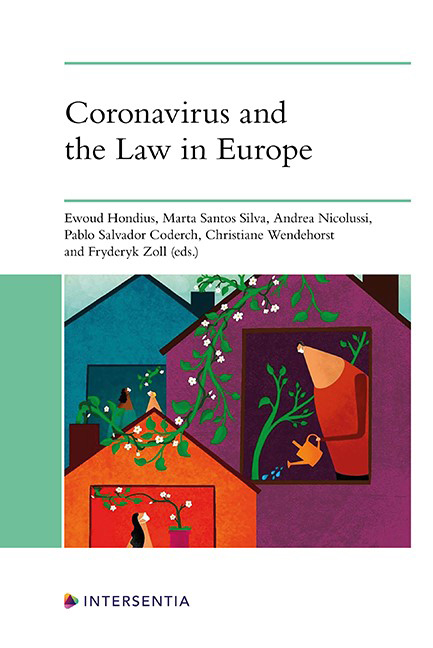Book contents
- Frontmatter
- Preface
- Contents
- List of Keywords
- List of Contributors
- PART I COVID-19 AND FUNDAMENTAL RIGHTS
- PART II STATES AGAINST THE PANDEMIC
- PART III COMPENSATION FOR COVID-19 RELATED DAMAGE
- PART IV CONTRACT LAW
- PART V CONSUMER LAW
- PART VI LABOUR AND SOCIAL LAW
- PART VII CORONAVIRUS CHANGING EUROPE
- Epilogue
- Annex: ELI Principles for the COVID-19 Crisis
- About the Editors
The Impacts of COVID-19 in Hungarian Contract Law
Published online by Cambridge University Press: 10 December 2021
- Frontmatter
- Preface
- Contents
- List of Keywords
- List of Contributors
- PART I COVID-19 AND FUNDAMENTAL RIGHTS
- PART II STATES AGAINST THE PANDEMIC
- PART III COMPENSATION FOR COVID-19 RELATED DAMAGE
- PART IV CONTRACT LAW
- PART V CONSUMER LAW
- PART VI LABOUR AND SOCIAL LAW
- PART VII CORONAVIRUS CHANGING EUROPE
- Epilogue
- Annex: ELI Principles for the COVID-19 Crisis
- About the Editors
Summary
The legal and social consequences of the COVID-19 epidemic raise challenges in legal systems. Incompleteness of contracts requires statutory or judicial intervention in order to reach the most efficient risk allocation in contractual relationships. In Hungarian contract law implied terms, impossibility and judicial amendment of contracts on the grounds of clausula rebus sic stantibus provide the doctrinal framework for such an assessment. These doctrines provide the legal framework for balancing the conflicting interests of the binding force of contracts and the demand for adjusting social and legal relationships to changing circumstances. Contracts are to be assessed on a case-by-case basis, but it is argued here that commercial and non-commercial transactions require different approaches and that direct legal and indirect social consequences should be considered differently.
Contracts create trust in the promise of the other party. This trust complies with the moral duty to keep promises. Contracts are social relationships and it seems to be evident that, if social and economic circumstances change, the contract has to be adapted to such changes. This requirement seems to be incompatible with the principle of binding force of contracts. Contracts are never complete due to high transaction costs. For this reason, they are not able to allocate the risks of unforeseen changes in the future. Thus, social and economic changes call for legislative or judicial adaptation of contracts to these new circumstances, although such intervention is normally unwelcomed and seen as an intrusion into the parties’ private autonomy. The problems emerging with statutory restrictions and changes of social behaviour due to the COVID-19 crisis is the same in Hungary as elsewhere and the toolkit of Hungarian private law to be used in such situations seems to be similar to those of other European jurisdictions, with certain peculiarities.
CHANGES OF CIRCUMSTANCES AND BINDING FORCE OF CONTRACTS
Contracts create rights and obligations in the system of private law. They are, however, not simply legal phenomena but they channel market mechanisms and they also establish social relationships. Contracts create trust and reliance upon the promise of the other party and the main function of contract law is protecting this reliance.
- Type
- Chapter
- Information
- Coronavirus and the Law in Europe , pp. 759 - 778Publisher: IntersentiaPrint publication year: 2021



